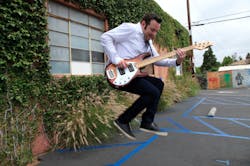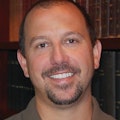How to get picked a BD+C 40 Under 40 winner: Tips from the editors
The 2016 "40 Under 40" competition is now open for entries! The entry form can be accessed here.
Frankly, the entry form is just the basic data. The real meat of your entry is your Personal Statement - the written document that tells the judges why you should be picked as a "40 Under 40" superstar.
So, get started putting that document together NOW! - and if you get the written draft to me (David Barista - [email protected]) by Friday, February 5, 2016, we'll give it an "Early Bird" review and tell you how to revise your entry to improve your chances of being picked.
Meanwhile, here are some tips that should help you prepare the best possible Personal Statement:
1. Entries are judged on several key factors:
• Career development
• Education attainment
• Service to professional organizations
• Community service
• Other evidence of exemplary professional or personal development.
2. CAREER DEVELOPMENT: You must show the growth of your skills, responsiblity, and success in your chosen profession: how fast you moved up the career ladder, how you took on increasing responsibility, how well you did in handling increasingly responsible roles. We're looking for a clear sense of growth and development in your professional work. BE SPECIFIC! If you were on the team that built the first net-zero building your firm was involved in, tell what your specific role and responsibilities were: Were you in charge? What title did you have on the job? How did your involvement make the difference?
3. EDUCATION: While formal education is not always a reliable indicator of career growth - everyone knows that Bill Gates dropped out of Harvard - the judges need to know how far you've gone in your education and how it contributed to your overall career development. Did you earn an advanced degree at night while working a full-time job? Did you go back to get advanced training - like a CDT or EDAC or some other professional designation? Note: Applicants who are professional educators will need to emphasize their education credentials more fully than non-academic applicants.
4. SERVICE TO PROFESSIONAL ORGANIZATIONS: How involved are you in your professional organization/s? Are you more than "a member of ..."? Did you chair a key committee? Run an education event for your society? Serve on the board? As before, BE SPECIFIC: How did your involvement produce results: how much money you helped raise for scholarships, how many course hours you taught for your association's continuing education program, how your efforts led to a new (and successful) program for your membership society. Wherever possible, supply quantifiable data to make your case.
5. COMMUNITY SERVICE: As with #4, BE SPECIFIC! Habitat for Humanity? How many days/year? How many houses did you help build, over what time period? What roles/titles did you assume in your community work? Were you President of your church board? Involved in ACE? What specifically did you do? Being a member of your firm's CANstruction team is one thing; devoting a year's volunteer work to chair an important committee for your college alma mater is another. Do you teach technical courses at a community college? How are you "giving back"?
6. OTHER EVIDENCE OF EXEMPLARY PROFESSIONAL OR PERSONAL DEVELOPMENT: Here is where you could discuss any special information that would be helpful to the judges. For example, if you took two years off work to care for an ailing family member, that would explain a gap in your career path. (Sensitive personal information would, of course, be kept private.) Are you involved in activities not specifically related to work or community/professional service - for example, are you learning to play the bassoon? Why? Here's your chance to tell a little about the inner you.
7. Make sure your AGE AND DATE OF BIRTH AT TIME OF ENTRY are clearly stated at the top of the first page of your written statement.
8. Make your written statement READABLE. The judges have to read hundreds entries. Give 'em a break. Use a fairly large type font, don't crowd the copy, provide decent-size margins on all 4 sides. If possible, use 1.5 line spacing for visual clarity. Don't be afraid to use Yellow Highlight and BOLD FACE and CAPs or even arrows -------> to point judges to the important stuff in your entry.]
9. Statement Length: How long should your statement be? Answer: Just long enough, but 1000 words max. Yes, that sounds like a cop-out, but your statement should tell your story concisely but comprehensively, in an organized fashion.
SUGGESTION: At the beginning of your Statement, list 3-5 main reasons why you should be named a "40 Under 40" superstar. Use those "bullet points" to structure your Personal Statement by supporting each point with detailed information.
10. "Additional Materials": Put these items (see the FAQ for some permissible items) in an Appendix. Don't clutter the main entry. INCLUDE A RESUME or CV (very important)!
11. Don't put the pages of your written statement in plastic sleeves. The judges need to write on your entry, and they can't write on plastic. Repeat: No plastic sleeves!
12. Letters of Endorsement: Not required, but we'll read them. The more specific these are, the better. We assume you're a nice person and wonderful to work with. Endorsement letters should go beyond the obvious. Letters of support that tell how your personal involvement solved a problem on a job or improved a project's outcome will have weight with the judges. General assertions will not.
A final word about the judging process: The judges do take into account the age of each applicant. We don't expect a 26-year-old to have achieved as much as a 38-year-old. Also, we're open to entries from a wide range of professionals who "touch" the commercial design and construction market, so if you're a construction lawyer or a business development/marketing professional at an AEC firm, you're probably eligible. For a ruling on eligibility, email David Barista: [email protected].
So, get those Early Birds in to David Barista at [email protected] by Friday, February 5, 2016!

